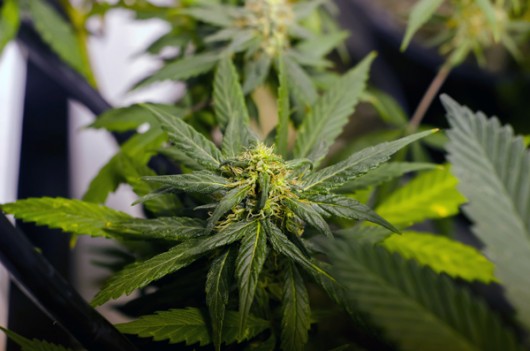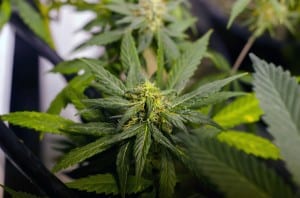The ad hoc Ketchikan Marijuana Advisory Committee heard a presentation Monday about marijuana concentrates. Ketchikan Police Chief Alan Bengaard described the process used to make concentrates, and the potential safety and health concerns.
At the end of the lunchtime meeting, the committee agreed to talk about a possible ban on concentrates during its next meeting.
Chief Bengaard started his presentation with what he called “Marijuana 101:” a brief tutorial on the recently legalized substance.
“You should all be aware that the active substance, tetrahydrocannabinol, commonly referred to as THC, is the active ingredient in marijuana, which is a controlled substance,” he said. “If you look at past history, marijuana 30 years ago had 5-7 percent THC content. Average concentration in street marijuana today is 15-20 percent.”
Bengaard said concentrates are essentially distilled marijuana. That means the active ingredient is extracted and concentrated, resulting in a product that can have as much as 80 percent THC.
He described how to extract THC. It starts with soaking marijuana plant material in a solvent, such as ethanol, isopropyl alcohol, propane or butane.
Bengaard passed around a kit that had been seized during a drug bust prior to legalization. It included a cylinder, packed with ground plant material. There was a hole at the top, and a filter at the bottom.
“The theory behind it is, you take a can of butane fuel. Holding the cylinder upright, you put the fuel at the top and you inject the entire can of butane fuel through that,” he said. “At the bottom, you’ll have drippings that come through, which will be an amberish liquid, that goes into another pan.”
Bengaard said that the butane evaporates, leaving behind the concentrated THC. That can be smoked, and he said a single hit of concentrate can equal about three whole joints.
Bengaard said there have been incidents of people needing medical care after smoking concentrated THC. In addition, butane gas is heavier than air, so it can collect in a home and accidentally ignite.
Later in the meeting, Committee Member Alan Bailey said the more he learns about concentrates and edible pot products, the more concerns he has. He asked for a discussion on a possible ban on concentrates and/or edible products for the next Marijuana Advisory Committee meeting.
Committee Member Dave Timmerman agreed, but noted that some people might need the option of smokeless marijuana products.
“The people I’ve heard back from positively about edibles are people that can’t smoke it, because of asthma or COPD or whatever kind of physical ailment they might have,” he said. “There may be a medical way for them to go, as far as getting access that maybe would bypass the other way.”
The Marijuana Advisory Committee also heard reports on where commercial regulation stands on a statewide level. The Legislature approved the formation of a Marijuana Advisory Board that would help develop regulations for a retail industry.
That would include a state excise tax.
Borough Attorney Scott Brandt-Erichsen said local communities won’t know whether or how much they can tax marijuana until after the state’s tax plan has been established, although local sales taxes will apply.
The Ketchikan Marijuana Advisory Committee’s next meeting is 5:30 p.m. May 11.







